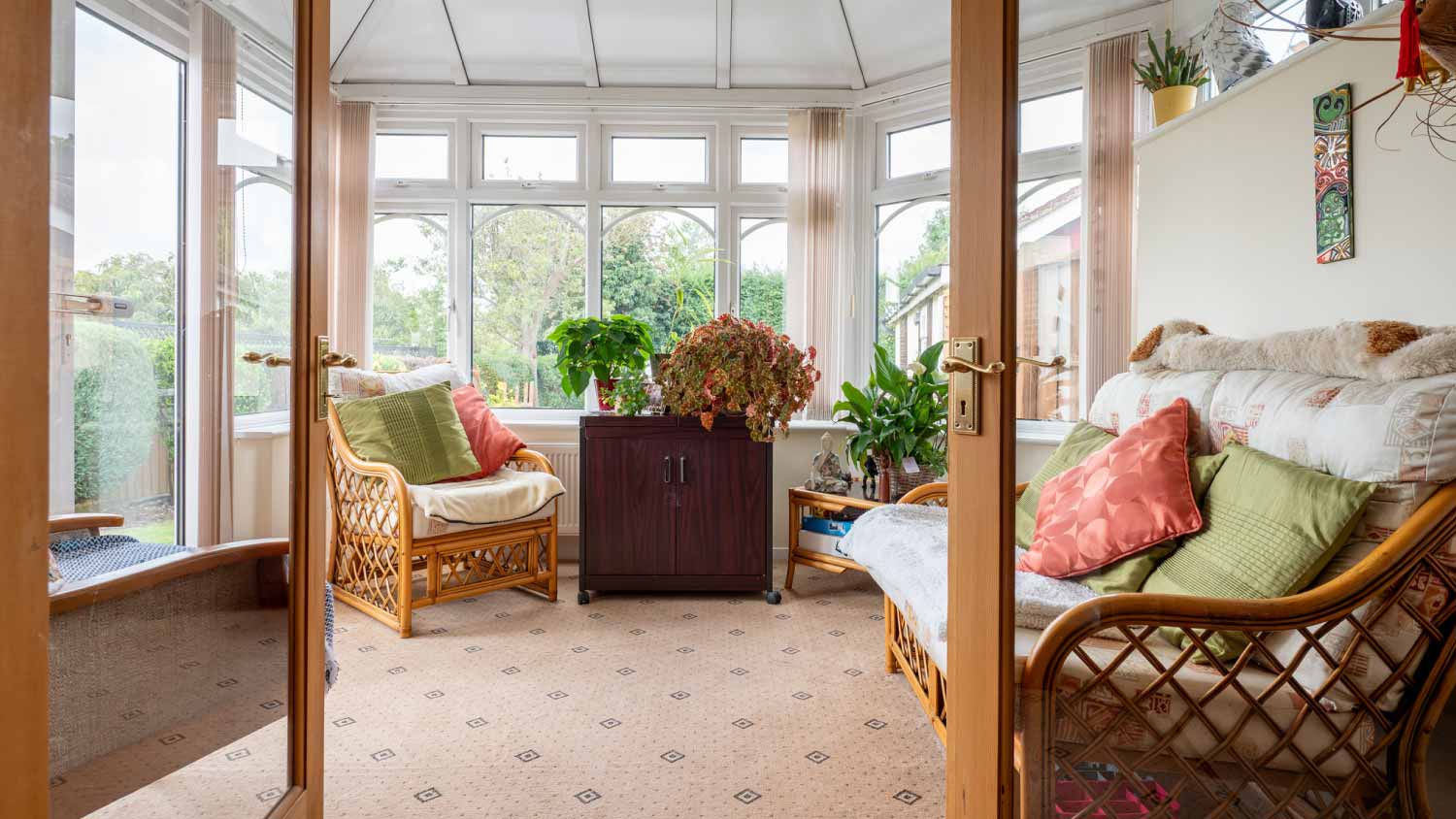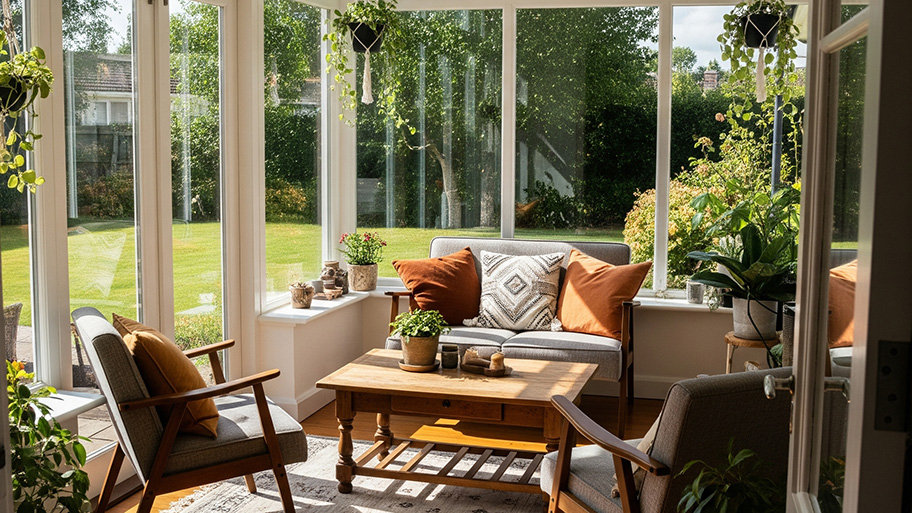
Considering adding a screened porch to your home? Discover the average cost of a screened-in porch, depending on its size, location, and more.
The cost of rescreen a porch screen is $3,960 on average, but it ranges from $876 to $7,054. Your contractor can assess your porch and provide a quote.


From spring breakfasts to summer happy hours, your porch or sunroom is a favorite gathering spot year-round. But even the best screens won’t last forever. The cost to rescreen a porch, sunroom, or patio ranges between $187 and $21,000. The average price most people pay is about $3,960, or $0.25 to $2.50 per square foot depending on the materials.
Minor repairs fall on the lower end of the price range, and more significant repairs fall on the higher end. The final price varies based on the extent of the damage and the quality of the replacement screen. The following breaks down all of the cost factors you need to know.
A few different factors ultimately impact the cost of rescreening a porch or sunroom. The square footage of the room, the material you choose, the replacement method, and your location will factor into the final project cost.
Whether you use your porch or sunroom as a play area for the kids or a quiet nook for the adults, if a screen rips, you’ll want it fixed ASAP.
There are several types of screen material for patio repairs and replacement, and each comes in at a different price point. If you live in an area with heavy rainfall and gusty winds, you’ll want the fabric to be weighty enough that it won’t sag or bulge.
These are the prices for the most common types of patio and sunroom screens (per square foot):
| Material | Average Cost |
|---|---|
| Fiberglass | $0.25–$0.50 |
| Aluminum | $0.35–$0.70 |
| Stainless steel | $1–$1.25 |
| Copper | $1–$1.50 |
| Brass | $1.50–$2.50 |
More affordable screens tend to rip and tear more easily than metal screens. Labor comes in at about $110 for the first 38 square feet, then $2 to $3 for each additional square foot. DIYing the job won’t cost a thing other than your time.
If you’re hiring a contractor, ask them what replacement method they’ll be using—screen panels or mesh—and determine if the quoted price is different for each method.
If you’re doing this as a DIY project, price out the cost difference between porch screen panels and mesh screen materials, the wood for framing, the base strips, and the caps to create the screened-in porch. Preassembled panels cost between $65 and $155, and unassembled porch screen panels cost around $110. Just the replacement screen kit can cost around $20.
Hiring a contractor to rescreen your porch can cost around $2,000 in labor. Here are a few related contractor costs that you may run into as your pro completes the project:
Roof repairs: $45–$75 per hour
Screen door installation: $50–$75 per hour
Exterior Pressure Wash: $50–$150 per hour
Even high-quality screens break, tear, rip, and get holes—sometimes caused by an overexcited pet or probing tiny fingers. The total cost you pay will depend on several factors, including where in the country you live. At the low end, the price can be less than $187, and at the high end, you can pay as much as $21,000.
| Location | Average Cost |
|---|---|
| Tampa, FL | $400–$1,500 |
| San Diego, CA | $2,175–$11,125 |
| Chicago, IL | $625–$15,000 |
| New York, NY | $1,000–$5,925 |
| San Antonio, TX | $3,450–$22,500 |
| Atlanta, GA | $4,500–$41,725 |
The average labor cost if you hire a sunroom or patio contractor near you is $110 for the first 38 square feet, then $2 to $3 for each additional square foot. Labor to replace glass windows in a sunroom or porch is about $500 for basic inserts. But if your repairs are pretty significant, you might pay as much as $2,000 in labor alone.
Rescreening your porch or sunroom doesn’t have to cost an arm and a leg. Some screen materials, like copper, are more expensive than fiberglass or aluminum.
Here are the costs to rescreen a 10-by-10 porch by type of material, not including labor or other materials.
Fiberglass screens are the most common choice for porches because they are less expensive than aluminum or steel screens. They’re also easier to install than some other types of screens because they don’t crease as easily and are flexible. A 10-by-10 porch rescreened with fiberglass at $0.50 per square foot is about $50, plus labor and other materials.
Aluminum screens are durable and long-lasting, with excellent outward visibility and a good appearance. However, over the years, aluminum can oxidize and develop a powdery coating that might limit visibility. A 10-by-10 porch rescreened with aluminum at $0.70 per square foot is about $70, plus labor and other materials.
In years past, many home porches were screened with copper screens. Today, to keep to historic standards, homeowners of these classic homes may choose to use copper or bronze to retain their home’s historic charm. If you were to rescreen a 10-by-10 porch with copper screens, you would pay about $150, plus labor and other materials.
Stainless steel screens are strong and durable. They’re also resistant to corrosion and age well. Stainless steel is more expensive than other screen materials for porches, but it’s easy to find and doesn’t bulge or sag as easily as fiberglass. A 10-by-10 porch rescreened with stainless steel will cost about $125, plus labor and other materials.
FYI—if you have a dog or cat (or small kids), you might consider paying extra for a pet-resistant screen. Made of vinyl-coated polyester, a pet-resistant screen is seven times stronger than regular screens. For a 96-inch-by-50-foot roll, you’ll pay about $270.
When you start any repair project, it’s common to come across more areas that need repairs. Additional repairs and maintenance when you’re rescreening a porch can include:
| Additional Porch Repairs | Average Cost |
|---|---|
| Ceiling repair | $45–$55 per square foot |
| Roof repair | $4–$11 per square foot |
| Exterior pressure wash | $0.10–$0.50 per square foot |
| Screen door replacement | $250–$400 |
| Screen door repair | $7–$200 |
The final cost of any additional repairs will depend on the extent of the damage and the materials you choose.
When it comes time to decide whether to repair or replace your porch screen, consider the extent of the damage and the cost to repair versus rescreening it. If there’s a small tear in the corner of one screen panel, you can repair the tear or replace that section—which will cost significantly less than rescreening.
For larger projects where multiple screens are damaged, it may make more sense to rescreen the entire area, especially if the original screens are old, faded, or in danger of tearing in the near future. You can ask your sunroom contractor to prepare a quote for each scenario, so you can compare the two and make the final decision.
Hiring a local sunroom professional ensures your screen enclosure is fitted correctly, fully taut, and long-lasting. While DIY kits are affordable, ranging from $250 to $300, depending on the size and scope of your project, they require experience and the right tools to avoid sagging or uneven results.
Here’s why hiring a pro is worth it for rescreening:
Pros can quickly remove damaged screens and install new ones without creases, gaps, or slack.
They have the right tools to stretch and secure screens tightly for a flawless finish.
Experts can help you choose the best screen material for your needs and budget.
Pros can handle the job faster without damaging screens or frames.
Here’s what’s realistic to DIY:
Replacing a single torn screen panel.
Repairing small rips with patch kits.
Using a rescreening kit to cover a small, manageable porch area.
Measure your porch or sunroom’s dimensions and note how many panels need replacing.
Ask your contractor about the best screen materials for your needs (fiberglass, aluminum, copper/aluminum, stainless steel, or pet-resistant).
Discuss with your sunroom pro whether your screen frame or structure needs minor repairs before installation.
Consider adding services like pressure washing, screen door repair, or roof touch-ups to bundle into one visit.
Home is the most important place on earth, which is why Angi has helped more than 150 million homeowners transform their houses into homes they adore. To help homeowners with their next project, Angi provides readers with the most accurate cost data and upholds strict editorial standards. We survey real Angi customers about their project costs to develop the pricing data you see, so you can make the best decisions for you and your home. We pair this data with research from reputable sources, including the U.S. Bureau of Labor Statistics, academic journals, market studies, and interviews with industry experts—all to ensure our prices reflect real-world projects.
Want to help us improve our cost data? Send us a recent project quote to [email protected]. Quotes and personal information will not be shared publicly.
From average costs to expert advice, get all the answers you need to get your job done.

Considering adding a screened porch to your home? Discover the average cost of a screened-in porch, depending on its size, location, and more.

While a solarium addition costs homeowners a fair amount of money, the return on investment is higher than most projects. Learn what affects the total cost and where you can save money.

Love soaking up sun but can’t stand the bugs? Learn how much a Florida room addition costs and what factors influence the price to get the best of both worlds.

A screened porch can keep you comfortable and pest-free all year long. Learn how to screen in a porch in eight simple steps.

Don't write off building a sunroom because of the price range. Here are nine ways to build a sunroom on a budget that aligns with your design.

A gazebo on decking can be a charming addition to an outdoor space, but not all decks can bear the weight. Here’s what you need to know about installing one.